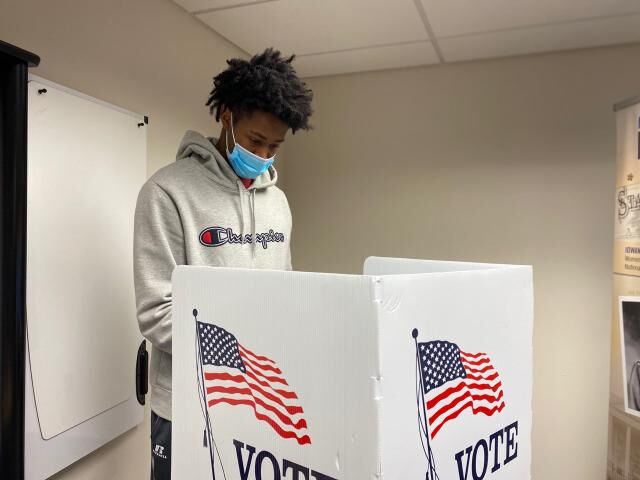Preparing for the Nov. 2 elections
As part of BACA, Iowa State redshirt junior Javan Johnson was registered to vote and cast his vote for Election Day on Nov. 3.
October 31, 2021
The turnout for voting in local elections is 10 percent of the voter turnout in primary elections. As the local election approaches here’s what to know about the importance of voting in local elections.
On Nov. 2, Ames community members will cast their ballots to vote for candidates on the Ames City Council and the Ames School Board.
As the local election approaches, many students may wonder, why does this matter?
The Ames City Council makes numerous decisions that affect one’s everyday life. Such as parking, water, sewer, sidewalks, noise ordinance, Ames police and other matters.
If you live off-campus, you most likely have to pay your water bill or electricity through the city of Ames, which is directly related to the Ames City Council.
“Local elections are really important for folks because local government is where we are most likely to touch government,” said Karen Kedrowski, director of Catt Center for Women in Politics. “It’s the local government that makes sure that we have water, sewer, garbage pickup and noise ordinances, I mean the kind of things that really dictate our lives.”
The school board election is also taking place on Nov. 2. This year, seven candidates are vying for three spots.
The school board is crucial for future teachers; this will indicate what kind of preparation their future students will have in terms of the priorities and policies, Kedrowksi said.
“School board elections are very important,” Kedrowski said. “In Ames this year, they are especially important because it’s really a schism along the lines of prioritizing masking, COVID-19 and issues of diversity.”
College students who go to school outside of their hometown can choose between voting in their college town or hometown elections.
“For college students, we spend nine to ten months a year in our college towns, so this is really our community, so we should be voting in our local elections at college,” said Rachel Junck, Iowa State business graduate student and Ward 4 Rep.“I think a good rule of thumb is to vote where you sleep on election night.”
Half of Ames’s population is Iowa State students, so it’s important that we have a say in the local elections, Junck said.
“Typically local elections turnout, especially when they are not connected to another major election like a midterm or presidential elections, is significantly lower,” Kedrowski said.
Voter turnout could range anywhere from 10 percent to 15 percent. In the 2018 election, turnout was unusual, especially with the increase of young voters, Kedrowski said.
Want to vote but are not sure how? There are a variety of resources to help you register to vote, find candidate information and polling locations.
On campus, the Student Government Civic Engagement Committee has been at work providing students with voting information. From tabling outside Parks Library to hosting local forums, the committee has been raising voter awareness.
“We like making [voting] information more accessible and easier to understand because I think that can be really hard to navigate, especially if you’ve no idea what you’re looking for,” said Sonja Paulson, junior in marketing and Civic Engagement Committee chair.
To find more information on candidates and voting the League of Women is a non-partisan website with information on registering to vote and candidate information.
For specific questions about voting, visit the Iowa Secretary of State website.
“Go out and vote even if you don’t think it matters; if you can’t think of why it personally affects you, it personally affects someone that you know,” said Paulson.

















